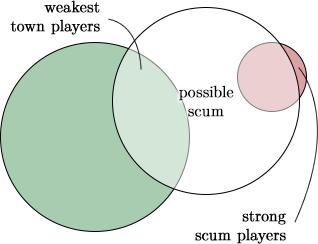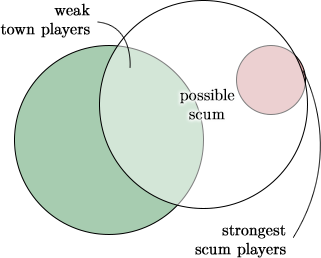You are viewing the MafiaScum.net Wiki. To play the game, visit the forum.
Quilford: Difference between revisions
No edit summary |
No edit summary |
||
| (3 intermediate revisions by the same user not shown) | |||
| Line 1: | Line 1: | ||
{{scummer|15481|userpic=logo_mafiascum_medium.jpg}} | {{scummer|15481|userpic=logo_mafiascum_medium.jpg}} | ||
I have | I have two—and only two—scumhunting precepts. I'm putting them here because I forget them a lot, and I shouldn't: | ||
# If someone is not scumhunting well, | # If someone is not scumhunting well, you should consider them correspondingly much more likely to be scum. | ||
# | # You should not consider players to be town for anything other than incisive scumhunting or believable claims. | ||
Scumhunting is defined as the process of analysing subtleties in a person's play to determine whether they are informed or uninformed, and therefore their alignment. | |||
<p>Both precepts follow directly from the core principle behind Mafia, as stated on [[Game of Mafia|this wiki:]]</p> | |||
: “At its heart, Mafia is a game pitting an uninformed majority against an informed minority.” | |||
As a result, the two precepts will always enable you to identify all except for the ultimate of scum players, who are capable of playing the game as if they truly were uninformed. | |||
<br> Other players rely on additional scumtells that have to do with things such as gut, tone and voting patterns; while they might help narrow the field down some, stronger scum players can slip past as well. (Figure 1) | |||
<p style="margin-bottom: 1.5em;"> The only real disadvantage of playing according to only the two precepts is that weak town players can fall afoul of the first one. | |||
<br> However, when questioned or put under pressure, these players can often produce satisfactory analysis. It's much, much harder for scum to do so. (Figure 2)</p> | |||
<div style="margin-bottom: 1em; margin-left: 1em;"><ul> | |||
<li style="display: inline-block; margin-right: 4em;"> [[File:Precepts_venn_other-precepts.png]] <p style="margin-top: 1.25em;"> Figure 1. Using precepts other than the two </p> </li> | |||
<li style="display: inline-block;"> [[File:Precepts_venn_two-precepts.png]] <p style="margin-top: 1.25em;"> Figure 2. Using only the two precepts </p> </li> | |||
</ul></div> | |||
I don't have any good ideas about how to play scum though. Usually I just like to find a nice dark place to lie in until I'm lynched or the game ends. | |||
Latest revision as of 11:04, 13 October 2016
| This user plays Mafia. (Talk) |
I have two—and only two—scumhunting precepts. I'm putting them here because I forget them a lot, and I shouldn't:
- If someone is not scumhunting well, you should consider them correspondingly much more likely to be scum.
- You should not consider players to be town for anything other than incisive scumhunting or believable claims.
Scumhunting is defined as the process of analysing subtleties in a person's play to determine whether they are informed or uninformed, and therefore their alignment.
Both precepts follow directly from the core principle behind Mafia, as stated on this wiki:
- “At its heart, Mafia is a game pitting an uninformed majority against an informed minority.”
As a result, the two precepts will always enable you to identify all except for the ultimate of scum players, who are capable of playing the game as if they truly were uninformed.
Other players rely on additional scumtells that have to do with things such as gut, tone and voting patterns; while they might help narrow the field down some, stronger scum players can slip past as well. (Figure 1)
The only real disadvantage of playing according to only the two precepts is that weak town players can fall afoul of the first one.
However, when questioned or put under pressure, these players can often produce satisfactory analysis. It's much, much harder for scum to do so. (Figure 2)
I don't have any good ideas about how to play scum though. Usually I just like to find a nice dark place to lie in until I'm lynched or the game ends.

